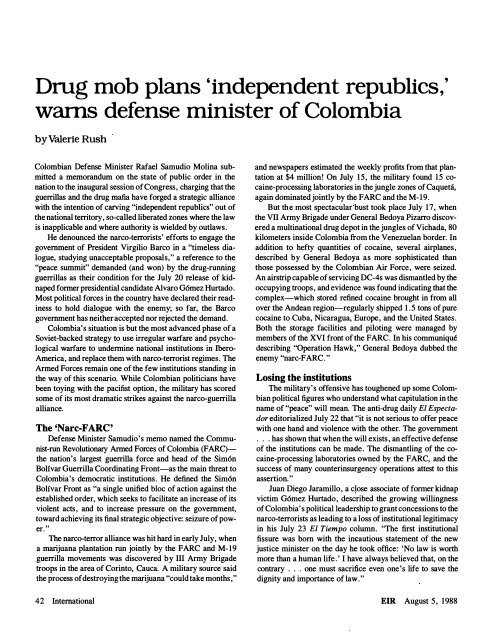View Full Issue - Executive Intelligence Review
View Full Issue - Executive Intelligence Review
View Full Issue - Executive Intelligence Review
You also want an ePaper? Increase the reach of your titles
YUMPU automatically turns print PDFs into web optimized ePapers that Google loves.
Drug mob plans 'independent republics,'<br />
warns defense minister of Colombia<br />
by Valerie Rush<br />
Colombian Defense Minister Rafael Samudio Molina submitted<br />
a memorandum on the state of public order in the<br />
nation to the inaugural session of Congress , charging that the<br />
guerrillas and the drug mafia have forged a strategic alliance<br />
with the intention of carving "independent republics" out of<br />
the national territory, so-called liberated zones where the law<br />
is inapplicable and where authority is wielded by outlaws.<br />
He denounced the narco-terrorists' efforts to engage the<br />
government of President Virgilio Barco in a "timeless dialogue,<br />
studying unacceptable proposals," a reference to the<br />
"peace summit" demanded (and won) by the drug-running<br />
guerrillas as their condition for the July 20 release of kidnaped<br />
former presidential candidate Alvaro G6mez Hurtado.<br />
Most political forces in the country have declared their readiness<br />
to hold dialogue with the enemy; so far, the Barco<br />
government has neither accepted nor rejected the demand.<br />
Colombia's situation is but the most advanced phase of a<br />
Soviet-backed strategy to use irregular warfare and psychological<br />
warfare to undermine national institutions in lbero<br />
America, and replace them with narco-terrorist regimes. The<br />
Armed Forces remain one of the few institutions standing in<br />
the way of this scenario. While Colombian politicians have<br />
been toying with the pacifist option , the military has scored<br />
some of its most dramatic strikes against the narco-guerrilla<br />
alliance.<br />
The 'Narc-FARe'<br />
Defense Minister Samudio's memo named the Communist-run<br />
Revolutionary Armed Forces of Colombia (FARC)the<br />
nation's largest guerrilla force and head of the Sim6n<br />
BoHvar Guerrilla Coordinating Front-as the main threat to<br />
Colombia's democratic institutions. He defined the Sim6n<br />
Bolfvar Front as "a single unified bloc of action against the<br />
established order, which seeks to facilitate an increase of its<br />
violent acts, and to increase pressure on the government,<br />
toward achieving its final strategic objective: seizure of power."<br />
The narco-terror alliance was hit hard in early July, when<br />
a marijuana plantation run jointly by the FARC and M-19<br />
guerrilla movements was discovered by III Army Brigade<br />
troops in the area of Corinto, Cauca. A military source said<br />
the process of destroying the marijuana "could take months ,"<br />
42 International<br />
and newspapers estimated the weekly profits from that plantation<br />
at $4 million! On July 15, the military found 15 cocaine-processing<br />
laboratories in the jungle zones of Caqueta,<br />
again dominated jointly by the FARC and the M-19.<br />
But the most spectacular bust took place July 17, when<br />
the VII Army Brigade under General Bedoya Pizarro discovered<br />
a multinational drug depot in the jungles of Vichada, 80<br />
kilometers inside Colombia from the Venezuelan border. In<br />
addition to hefty quantities of cocaine, several airplanes,<br />
described by General Bedoya as more sophisticated than<br />
those possessed by the Colombian Air Force, were seized.<br />
An airstrip capable of servicing DC-4s was dismantled by the<br />
occupying troops, and evidence was found indicating that the<br />
complex-which stored refined cocaine brought in from all<br />
over the Andean region-regularly shipped 1.5 tons of pure<br />
cocaine to Cuba, Nicaragua, Europe, and the United States.<br />
Both the storage facilities and piloting were managed by<br />
members of the XVI front of the FARC. In his communique<br />
describing "Operation Hawk," General Bedoya dubbed the<br />
enemy "narc-F ARC."<br />
Losing the institutions<br />
The military's offensive has toughened up some Colombian<br />
political figures who understand what capitulation in the<br />
name of "peace" will mean. The anti-drug daily El Espectador<br />
editorialized July 22 that "it is not serious to offer peace<br />
with one hand and violence with the other. The government<br />
. . . has shown that when the will exists, an effective defense<br />
of the institutions can be made. The dismantling of the cocaine-processing<br />
laboratories owned by the FARC, and the<br />
success of many counterinsurgency operations attest to this<br />
assertion. "<br />
Juan Diego Jaramillo, a close associate of former kidnap<br />
victim G6mez Hurtado, described the growing willingness<br />
of Colombia's political leadership to grant concessions to the<br />
narco-terrorists as leading to a loss of institutional legitimacy<br />
in his July 23 El Tiempo column. "The first institutional<br />
fissure was born with the incautious statement of the new<br />
justice minister on the day he took office: 'No law is worth<br />
more than a human life.' I have always believed that, on the<br />
contrary . . . one must sacrifice even one's life to save the<br />
dignity and importance of law. "<br />
EIR August 5, 1988

















